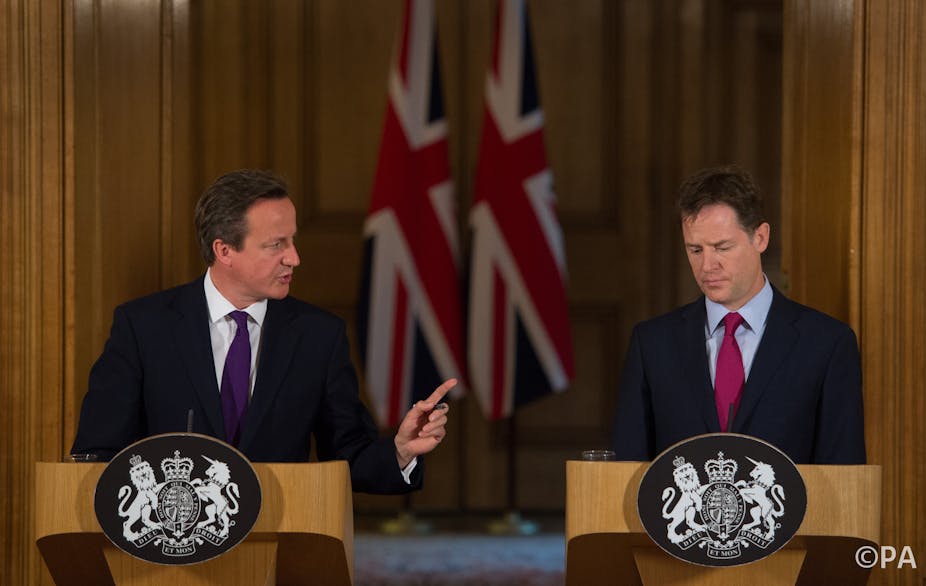As it becomes clear that a hung parliament is the most likely outcome of the May 7 UK general election, Liberal Democrat MPs are going into preparation mode. The party may end up with the worst electoral results in a generation, but it may once again find itself in the position of kingmaker thanks to the vagaries of the electoral system and of coalition politics.
This scenario is the stuff of nightmares for many backbenchers who would prefer to spend the next five years licking their wounds in the opposition benches. Some are so bruised by the experience of coalition government with the Conservatives that they claim to get down on their knees every night “and pray that the next election doesn’t produce a hung parliament”.
But the leadership thinks differently. Despite the many humiliations, Nick Clegg believes his is a party of government. For that reason he has been preparing a strategy for negotiating a new coalition with whichever party holds the greatest number of seats on May 8. But if he wants to ensure that the voice of his party matters, he needs to learn these four lessons.
1. Remember your voters
The first lesson is about the party’s relation with its voters. The Liberal Democrats’ main challenge is to convince enough voters to elect a sufficient number of MPs so the party is considered to be a plausible coalition partner. In order to do so, it is vital not to make promises that can’t be kept.
As opinion polls and results from local and European Parliament elections showed, promising to abolish tuition fees at the last election proved to be a colossal error.
2. Think bigger
Liberal Democrat unpopularity is not only a result of reneging on manifesto promises though. The party’s influence over coalition policies is practically invisible, though it is undeniable that it has restrained the Conservatives in areas such as welfare cuts and repatriating powers from Brussels.
In 2010, the party invested all its chips in electoral reform and in a few other token policies. As we now know, this was another big mistake. The Liberal Democrats lost the referendum on the alternative vote electoral system and proposals for House of Lords reform were defeated in the House of Commons. Policy achievements – such as the pupil premium, free school meals, the increase in the tax allowance and so on – tend to be in micro areas of public policy that are invisible to most voters.
The Liberal Democrats should therefore approach 2015 negotiations with a longer list of policy priorities. This list should go beyond the party’s favourite areas of constitutional reform and environmental protection and include areas of high public interest. For instance, they could develop a red line stance on the public deficit, or on the referendum on EU membership.
3. Push for portfolios
To ensure influence, the Liberal Democrats will need to adopt a different approach to the distribution of ministerial portfolios too. This time MPs need to go for depth over breadth.
After five years in government, the Liberal Democrats are acutely aware that spreading ministers across as many departments as possible did not deliver influence. The few departments it controlled were not the big spenders and, when they were, the Liberal Democrat cabinet minister did not have autonomy or sufficient resources. Danny Alexander, for example, may have made it to the Treasury but he has had only modest policy autonomy.
The Liberal Democrats should therefore seek to obtain fewer government posts but insist on controlling high-spending and visible government departments such as the Department for Education, the Department for International Development, the Home Office or even the Foreign Office.
4. Find strength in numbers
With rare exceptions, Liberal Democrat junior ministers either “went native” in their departments, like Jeremy Browne or felt, like Norman Baker, they were the “the cuckoo in the nest”.

To avoid the Baker scenario, the Liberal Democrats should deploy more than one junior minister in key departments that are led by the senior party of the coalition.
Of course, applying these lessons does not guarantee influence for the junior party in a coalition government; many other factors are at play once votes have been cast. But they can create the conditions for more equal relations between the parties than the Liberal Democrats have experienced for the past five years.

